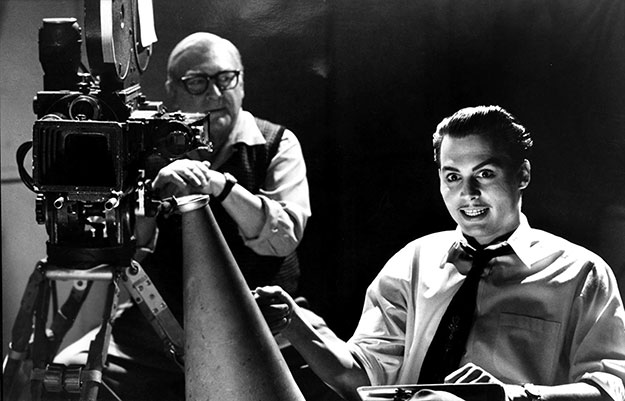It's time, once again, for Three Easy Pieces, the column where I take you aside and gab about a particular corner of pop culture. First, we start at the beginning, and then take you on through to how it looks today. This month, I'm talking about one of my favorite genres of film: movies about making movies. Something about the self-reflexive nature of these films, the mythologizing, the depicting of the inner workings of my preferred art form, just excites me like little else. For our purposes here, I'll be avoiding documentaries about film, since those deserve their own eventual spotlight. No, we're looking at narratives, where the truth about filmmaking can be shaped to whatever the filmmaker wants it to be.
 BIRTH: Singin' in the Rain (1952)
BIRTH: Singin' in the Rain (1952)
Honorable mention: Sullivan's Travels, F for Fake, Hellzapoppin', 8 1/2
The truth is that people have basically been making movies about making movies since they started making movies -- such a groundbreaking medium almost immediately inspired examinations of how they got made. But Singin' in the Rain is getting the shout-out here, because it's not only one of the most superbly joyous movies ever made, but it was also able to document the history and evolution of film from its perspective in the early ‘50s.
Beyond being a fizzy, Technicolor burst of a musical, Singin' in the Rain is also a picture of a time (1927) when Hollywood was making the move from silent films to talkies, and the existential crisis actors encounter when finding out that they'll need to actually start speaking in their movies. There's also plenty of pointed humor about the artifice of celebrity, and the trio of Gene Kelly, Debbie Reynolds, and Donald O'Connor are utterly astounding.
DEVELOPMENT: Ed Wood (1994)
Honorable mention: The Big Picture, The Player, Get Shorty, Living in Oblivion, Bowfinger, Barton Fink
From the glitz and glamor of Hollywood, we move to its shoddy underbelly with Ed Wood. While Singin' in the Rain was merely inspired by the events of Hollywood's past, Ed Wood is a biopic of the very real director Edward D. Wood Jr., the man frequently cited as the worst director of all time. Directed by Tim Burton and starring Johnny Depp -- and being the career best of both -- Ed Wood finds its titular director earnestly, passionately going about making Plan 9 from Outer Space, Glen or Glenda, and other works that would be regarded as good-bad movie classics.
The heart of the movie is in the makeshift family of outsiders and weirdoes that Wood assembles as his cast and crew -- in particular, his relationship with an old and opiate-addicted Bela Lugosi, in an Oscar-winning turn from Martin Landau. Ed Wood is touching, hilarious, gorgeously shot in black and white, and its exhaustive look at the process of filmmaking (however terrible those films may end up being) is legitimately inspiring for anyone thinking about making a career in art.
TODAY: The Disaster Artist (2017)
Honorable mention: Baadasssss!, Adaptation., Shadow of the Vampire, Tropic Thunder, State and Main
In the years since Ed Wood passed from this mortal coil, bad movies have found their audience, thanks to things like Mystery Science Theater 3000, the increasing accessibility of filmmaking equipment and distribution, and the Internet's ability to give anything visibility. If there could be a successor to the title of worst director ever, it would be Tommy Wiseau, the guy behind good-bad movie all-timer The Room. So, it was only a matter of time before he would get his own Ed Wood-esque biopic.
The Disaster Artist lacks the heart of Ed Wood, as it misses the genuine affection that Burton had for his subject. Director James Franco also stars as Wiseau, chronicling the creation of The Room with excruciating detail (a fact that the end credits boasts, playing scenes from The Disaster Artist and The Room side-by-side to show off the accuracy). Perhaps it would've been impossible to wring much emotion from this material, as Wiseau is a fundamentally inscrutable subject, refusing to reveal much of anything about his personal life with those who are fascinated to know. Still, The Disaster Artist stands as a breezy look at the making of a very bizarre film.
Three Easy Pieces will return, next month, with: Oscar Bait.




Read Comments